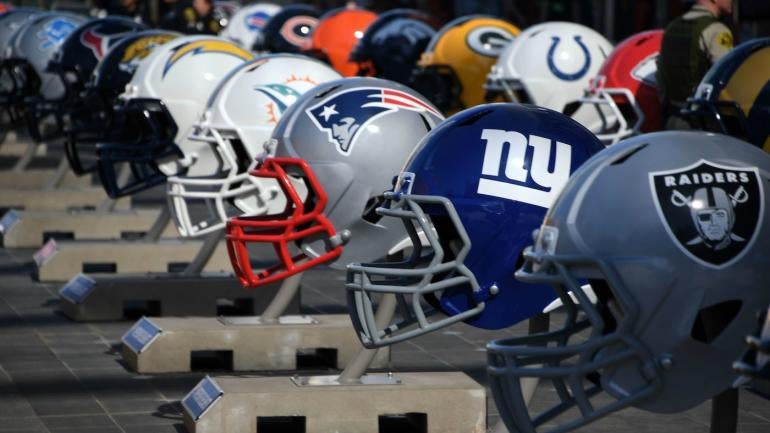
For the first time in 43 years, the NFL is going to be expanding its regular season schedule and that's happening because the league's 32 owners voted on Tuesday to go from 16 to 17 games starting with the 2021 season.
The NFL formula worked perfect when the league only needed 32 teams to play 16 games, but now that there's an odd number of games on the schedule, the league had to add a slightly complicated tweak to its scheduling formula this week so here's a look at the new formula with the changes for the extra game in italics.
- Home and away against three divisional opponents (six games)
- The four teams from another division within its conference on a rotating three-year cycle (four games). This is why the NFC West is facing the NFC North in 2021.
- The four teams from a division in the other conference on a rotating four-year cycle (four games). This is why the NFC West is facing the AFC South in 2021.
- Two intraconference games based on the prior year's standings (two games). These games match a first-place team against the first-place teams in the two same-conference divisions the team is not scheduled to play that season. The second-place, third-place and fourth-place teams in a conference are matched in the same way each year. This is why the last-place 49ers are playing the last-place Falcons and last-place Eagles in 2021.
- One interconference game based on the prior year's standings on a rotating four-year cycle (one game). These games match a first-place team from one division against a first-place team in an opposite conference division that the team is not scheduled to play that season. The second-place, third-place and fourth-place teams in each division are matched in the same way each year. The home conference for this game will rotate each season.
if you read that last rule, it's not exactly easy to figure out who your favorite team will be playing going forward. For instance, the Chiefs will be hosting the Packers in 2021, but why are they playing an NFC North team and not an NFC South team and what does that rule tell you about who they'll play in 2022? Glad you asked because the rule doesn't exactly explain that.
The formula for the new game is slightly complicated, but basically, it will go like this: The matchups are based on the cross-conference division that each team played two years ago. Each team will play one opponent from that division that finished in the same spot in the prior year's standings.
For instance, the AFC West played the NFC North in 2019, so each team in that division will play one game against the NFC North in 2021 and they'll play against the team that finished in the same spot in the prior year's standings. This is how you get Packers at Chiefs (first place vs. first place) and Bears at Raiders (second place at second place). The other 17th game matchups for 2020 are NFC East vs. AFC East, NFC South vs. AFC South and NFC West vs. AFC North.
With that in mind, here's a look at the four-year rotation of the new scheduling formula. We'll list each division along with the teams from the opposite conference that they'll be playing from now until 2024.
AFC North
2021
- NFC North, four games (Each AFC North team will play all four NFC North teams)
- NFC West, one game (AFC North team will play the NFC West team that finished in the same spot in the prior year's standings).
2022
- NFC South, four games (Each AFC North team will play all four NFC South teams)
- NFC East, one game (AFC North team will play the NFC East team that finished in the same spot in the prior year's standings).
2023
- NFC West, four games (Each AFC North team will play all four NFC West teams)
- NFC North, one game (AFC North team will play the NFC North team that finished in the same spot in the prior year's standings)
2024
- NFC East, four games (Each AFC North team will play all four NFC East teams)
- NFC South, one game (AFC North team will play the NFC South team that finished in the same spot in the prior year's standings).
AFC South
2021
- NFC West, four games
- NFC South, one game
2022
- NFC East, four games
- NFC North, one game
2023
- NFC South, four games
- NFC West, one game
2024
- NFC North, four games
- NFC East, one game
AFC East
2021
- NFC South, four games
- NFC East, one game
2022
- NFC North, four games
- NFC West, one game
2023
- NFC East, four games
- NFC South, one game
2024
- NFC West, four games
- NFC North, one game
AFC West
2021
- NFC East, four games
- NFC North, one game
2022
- NFC West, four games
- NFC South, one game
2023
- NFC North, four games
- NFC East, one game
2024
- NFC South, four games
- NFC West, one game
NFC North
2021
- AFC North, four games
- AFC West, one game
2022
- AFC East, four games
- AFC South, one game
2023
- AFC West, four games
- AFC North, one game
2024
- AFC South, four games
- AFC East, one game
NFC South
2021
- AFC East, four games
- AFC South, one game
2022
- AFC North, four games
- AFC West, one game
2023
- AFC South, four games
- AFC East, one game
2024
- AFC West, four games
- AFC North, one game
NFC East
2021
- AFC West, four games
- AFC East, one game
2022
- AFC South, four games
- AFC North, one game
2023
- AFC East, four games
- AFC West, one game
2024
- AFC North, four games
- AFC South, one game
NFC West
2021
- AFC South, four games
- AFC North, one game
2022
- AFC West, four games
- AFC East, one game
2023
- AFC North, four games
- AFC South, one game
2024
- AFC East, four games
- AFC West, one game
![[object Object] Logo](https://sportshub.cbsistatic.com/i/2020/04/22/e9ceb731-8b3f-4c60-98fe-090ab66a2997/screen-shot-2020-04-22-at-11-04-56-am.png)


















